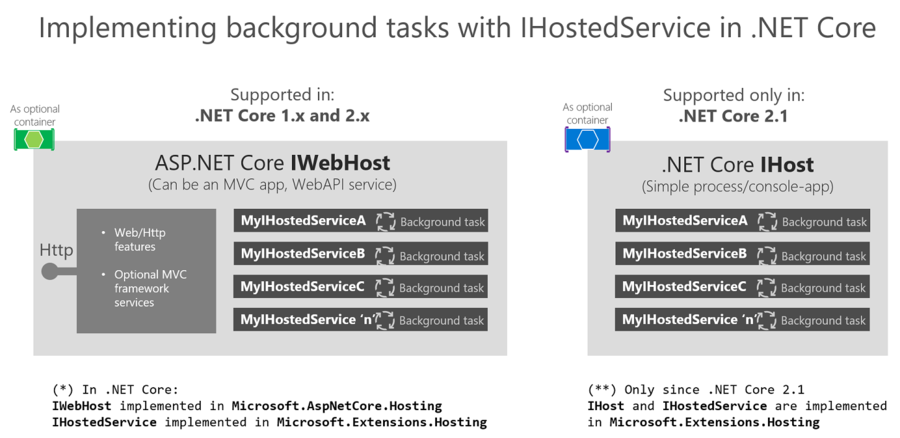在asp.net core中使用托管服务实现后台任务
在业务场景中经常需要后台服务不停的或定时处理一些任务,这些任务是不需要及时响应请求的。
在 asp.net中会使用windows服务来处理。
在 asp.net core中,可以使用托管服务来实现,托管服务是一个类,具有实现IHostService接口的后台任务逻辑。
导入包
使用NUGET添加Microsoft.Extensions.Hosting包到项目中
Microsoft.Extensions.Hosting包地址
IHostedService接口
- 托管服务必须实现IHostedService接口,该接口为主机管理的对象定义了两种方法。
StartAsync(CancellationToken) - StartAsync包含启动后台任务的逻辑。使用Web主机时,StartAsync在服务器启动并且触发IApplicationLifetime.ApplicationStarted后调用。使用Generic Host时,StartAsync会在ApplicationStarted触发之前调用。

- StopAsync(CancellationToken) - 在主机执行正常关闭时触发。StopAsync包含结束后台任务的逻辑。实现IDisposable和终结器(析构函数)来处理任何非托管资源。
取消令牌具有默认的五秒超时,以指示关闭过程不再是正常的。在令牌上请求取消时:
应该中止应用正在执行的任何剩余后台操作。
任何调用的方法都StopAsync应该立即返回。
但是,在请求取消后,任务不会被放弃 - 调用者等待所有任务完成。
如果应用程序被意外关闭(例如,应用程序的进程失败),则StopAsync可能无法调用。因此,StopAsync是有可能不会被调用的。
托管服务在应用启动时激活一次,并在应用关闭时正常关闭。为防止异常,最好继承IDispose接口,释放资源
定时后台任务用例
可以写一个托管服务类直接继承IHostedService,和IDisposable接口
public class MyTimerHostedService : IHostedService, IDisposable
{
private Timer _timer;
public Task StartAsync(CancellationToken cancellationToken)
{
Console.WriteLine("启动定时任务托管服务");
_timer = new Timer(DoWork, null, TimeSpan.Zero,
TimeSpan.FromSeconds(0.5));
return Task.CompletedTask;
}
private void DoWork(object state)
{
Console.WriteLine("定时任务处理中");
}
public Task StopAsync(CancellationToken cancellationToken)
{
_timer?.Change(Timeout.Infinite, 0);
Console.WriteLine("停止定时任务");
return Task.CompletedTask;
}
public void Dispose()
{
// 手动释放定时器
_timer?.Dispose();
}
}
该服务Startup.ConfigureServices使用AddHostedService扩展方法注册:
services.AddHostedService<MyTimerHostedService>();
使用通用主机启动 托管服务
class Program
{
static void Main(string[] args)
{
var host = new HostBuilder().ConfigureServices((hostContext, services) =>
{
services.AddHostedService<MyTimerHostedService>();
}).Build();
host.Run();
Console.WriteLine("Hello World!");
Console.ReadLine();
}
}

使用后台服务BackgroundService 实现
.NET Core中实现的抽象BackgroundService基类。
// Copyright (c) .NET Foundation. Licensed under the Apache License, Version 2.0.
/// <summary>
/// Base class for implementing a long running <see cref="IHostedService"/>.
/// </summary>
public abstract class BackgroundService : IHostedService, IDisposable
{
private Task _executingTask;
private readonly CancellationTokenSource _stoppingCts =
new CancellationTokenSource();
protected abstract Task ExecuteAsync(CancellationToken stoppingToken);
public virtual Task StartAsync(CancellationToken cancellationToken)
{
// Store the task we're executing
_executingTask = ExecuteAsync(_stoppingCts.Token);
// If the task is completed then return it,
// this will bubble cancellation and failure to the caller
if (_executingTask.IsCompleted)
{
return _executingTask;
}
// Otherwise it's running
return Task.CompletedTask;
}
public virtual async Task StopAsync(CancellationToken cancellationToken)
{
// Stop called without start
if (_executingTask == null)
{
return;
}
try
{
// Signal cancellation to the executing method
_stoppingCts.Cancel();
}
finally
{
// Wait until the task completes or the stop token triggers
await Task.WhenAny(_executingTask, Task.Delay(Timeout.Infinite,
cancellationToken));
}
}
public virtual void Dispose()
{
_stoppingCts.Cancel();
}
}
由于抽象类已经实现了IHostService接口定义的方法,只需要写子类去继承BackgroundService, 在自己的自定义托管服务类中实现ExecuteAsync()方法
public class MyBackGroundService : BackgroundService
{
protected override async Task ExecuteAsync(CancellationToken stoppingToken)
{
while (!stoppingToken.IsCancellationRequested)
{
Console.WriteLine("MyBackGroundService doing");
//延迟500毫秒执行 相当于使用了定时器
await Task.Delay(500, stoppingToken);
}
}
}
在主机中托管服务
class Program
{
static void Main(string[] args)
{
var host = new HostBuilder().ConfigureServices((hostContext, services) =>
{
//services.AddHostedService<MyTimerHostedService>();
services.AddHostedService<MyBackGroundService>();
}).Build();
host.Run();
Console.WriteLine("Hello World!");
Console.ReadLine();
}
}
使用了HostService后极大的方便了后台任务的管理


 浙公网安备 33010602011771号
浙公网安备 33010602011771号